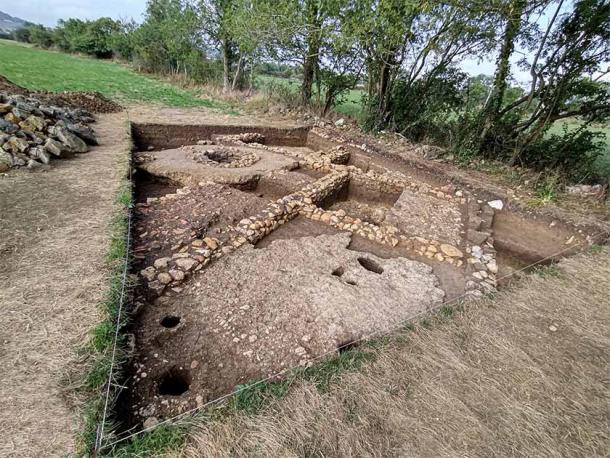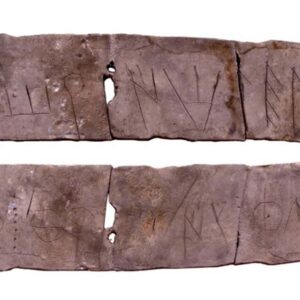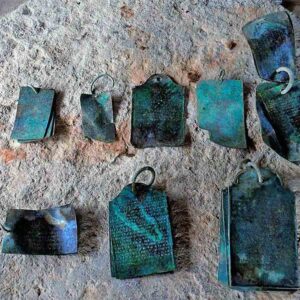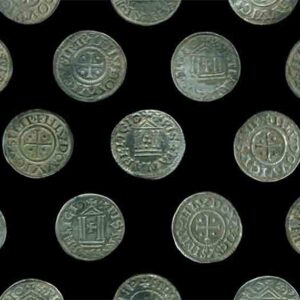Up to date
20 October, 2023 – 19:02
Sahir
Distinctive 2,000-Yr-Previous Sandal Discovered In A Roman Effectively In Spain
- Learn Later
A group of artifacts, together with a singular Roman sandal thought to have been misplaced by a well-cleaner 2,000-years-ago, has been uncovered at an historical Roman settlement referred to as Lucus Asturum in northern Spain. The present spherical of excavations on the web site is a continuation of digs performed two years in the past when a staff of archaeologists uncovered a big home with a courtyard and a effectively. This time round, a system of pulleys was employed to descend into the effectively’s depths, to see what treasures it’d maintain.
Unicum: Roman Sandal Is Really One in all a Variety!
Probably the most thrilling artifact is a one-of-a-kind archaeological discover, technically termed as a unicum. The Roman sandal is distinguished by its design – circles, ovals, and falciform (sickle-like) patterns. Inside Hispania, there are scarcely greater than 20 preserved Roman sandals, and this explicit one stands alone in its make and ornament. It’s in an distinctive state of preservation, owing to the anaerobic surroundings created by the silt on the effectively’s backside, successfully stopping the proliferation of microorganisms, experiences El Pais.
“The stays we discovered, because of the anoxia generated by the excessive water desk within the space, are in an distinctive state,” says archaeologist Esperanza Martín, who led each the primary dig on the web site in modern-day Lugo de Llanera in Asturias, northern Spain in 2021, and the present exploration. “The silts have created an anaerobic surroundings because of the plasticity of the clays that compose them, so the natural supplies have been completely preserved,” she added, experiences Arkeonews.

Archaeologist Esperanza Martín descends into the effectively found in Lugo de Llanera. The distinctive Roman sandal was discovered well-preserved because of the surroundings and sediment on the backside of the effectively. (Angel Villa)
At a depth of roughly 3 meters (9.85 ft), the consultants efficiently retrieved a fraction of the effectively’s picket cowl, a specifically designed tiled flooring for silt separation, in addition to an interesting assortment of things, as talked about. These included quite a few jars, an assortment of seeds, chestnuts, pine nuts, mollusk shells, remnants of each home and wild fauna, a formidable bronze cauldron generally known as an “acetre,” a dainty metallic ring, and, notably, the Roman sandal.
“It’s virtually full and retains the reducing notches to carry it within the higher leg space. It’s greater than probably that it was misplaced by somebody who got here in to scrub [the well] when it acquired caught within the silt. It’s a distinctive object, as it’s adorned,” added Martín.
- Adidas of Historical Rome: Historical Style Unveiled with Discovery of Roman Shoe Hoard
- The Eternal Shoe: What Does This 5,500-Yr-old Shoe Present in a Cave Inform Us About Historical Armenians?
Lucus Asturum: A Historical past of Occupation and Excavation
Lucus Asturum, located within the northern area of the Iberian Peninsula in the course of the interval spanning from the first to the 4th centuries AD, served as a distinguished administrative heart and very important communication hub. Its historic significance is underscored by its point out within the famend work “Geography” by the Greek polymath, Ptolemy. This metropolis boasted a plethora of each private and non-private buildings, testifying to its pivotal position within the period.

Lucus Asturum. Excavation de 2023. (Esperanza Martín/Astures)
The historic significance of Lucus Asturum has been acknowledged since historical instances, however its traces had been misplaced over the centuries till the Provincial Fee of Monuments performed the preliminary excavations in the course of the Nineteen Thirties. Sadly, all of the archaeological findings and associated documentation from that interval have lengthy vanished or been destroyed.
In 1989, Carmen Fernández Ochoa’s staff managed to rediscover the positioning, uncovering a votive altar devoted to the Lares viales (family deities), a medieval necropolis, and well-preserved stays relationship again to the first century AD. In 2018, with the help and funding of the Llanera Metropolis Council, excavations had been as soon as once more initiated.
This time, the archaeologists adopted non-invasive methods such because the Lidar laser detection system, geophysical surveys, satellite tv for pc imagery, and thermography. By means of these strategies, they revealed an underlying archaeological layer beneath the meadows, which included a set of notably massive baths that had sadly suffered in depth plundering, and a well-preserved canal, experiences El Pais.
- Mudlarker Finds Bronze Age Shoe on a UK Riverbank Dated 2,800 Years Previous!
- Unveiling the Style Secrets and techniques of Historical Roman Britain (Video)
The COVID-19 pandemic quickly halted the excavation efforts. When work resumed in 2021, the staff made additional discoveries: a refuse dump relationship again to the interval between the first and 4th centuries, a number of distinct buildings separated by a street, and a considerable residential space that featured the aforementioned effectively, nonetheless bearing the stonework marks from its unique opening some two millennia in the past!
Prime picture: The Roman sandal in situ, found in Lugo de Llanera, Asturias. Supply: Esperanza Martin/Astures
By Sahir Pandey
References
Bartek, J. 2023. Distinctive 2,000-Yr-Previous Embellished Roman Sandal Misplaced By Effectively-Cleaner Discovered In Spain. Out there at: https://www.ancientpages.com/2023/10/19/2000-year-old-sandal-spain/.
Büyükyıldırım, O. 2023. Distinctive 2,000-year-old Embellished Roman Sandal Found in Spain. Out there at: https://arkeonews.net/unique-2000-year-old-decorated-roman-sandal-discovered-in-spain/.
Olaya, V.G. 2023. The Roman well-cleaner who misplaced a sandal 2,000 years in the past in Spain. Out there at: https://english.elpais.com/culture/2023-10-17/the-roman-well-cleaner-who-lost-a-sandal-2000-years-ago-in-spain.html.





